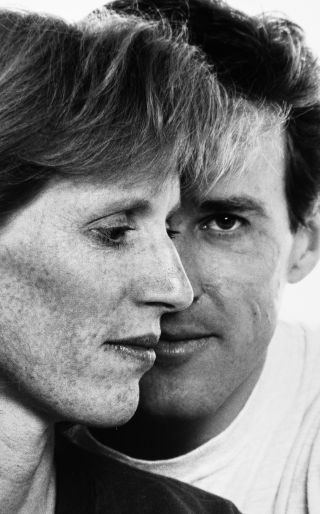Caregiving
Optimism and Hope: A Care Partner's View
A Personal Perspective: Living positively with incurable disease.
Posted February 15, 2024 Reviewed by Michelle Quirk
Key points
- Living with and caring for someone with an incurable disease is messy.
- Hope and optimism in caregiving for chronic illness is essential.
- Giving in is not the same as giving up.

Young-onset Parkinson’s disease unexpectedly took over our life after we had been married for 17 years and had two children under the age of 10 at home. The diagnosis of my husband's disease changed us both. We were pursuing our careers and raising our kids, and we lived with a sense that we'd always be young and strong and able. We shared an elite endurance athlete background and were used to pushing ourselves and taking risks to win big. He was the ultimate crowd pleaser, winning more than 300 races in his almost 20-year cycling career. The disease wasn't a competition, but it was a grueling test: a desolate contest with neither the opportunity to beat the disease and claim victory nor the option to drop out and quit. We learned swiftly this was a disease of inexorable loss.
First, we cultivated optimism.
At the time of diagnosis, we didn’t know much about the disease, except that it was degenerative, progressive, and incurable. They tell you it won't kill you, but we know it reduces the quality of life. Peter Attia writes about longevity and the art of living well in his book Outlive with a focus on what he calls healthspan and prolonging "aliveness." Had disease already robbed him—us—of the possibility to lead a healthful life?
We couldn’t have realized then just how messy, unpredictable, or complicated it would be, but we charted a course cultivated by our innate optimism.
Hope was harder to find immediately after diagnosis. We ran a bike touring business, and our motto was Enjoy Life. We helped our clients to stay grounded using one upbeat word for a mantra: Yes! We taught ourselves to harness that same positivity to accept the diagnosis and carry on and energetically resisted pessimism as if it were kryptonite, knowing negative thinking couldn’t take us anywhere that we wanted to go.
In recent years, we simplified our lives by choice, stayed active, and downsized our home, but the unwanted guest—which is how we refer to Parkinson’s—has stayed with us. Parkinson’s is an odd bedfellow making everything difficult. It has disrupted almost every aspect of our lives despite our best efforts to gallantly—and not always gracefully—forge ahead. We understand and respect its nature and try not to linger on what is—or was—lost.
As the primary care partner, I’ve learned many useful lessons: how to set boundaries, how to ask for help, how to create a team, and how to delegate. Most importantly, I've learned to nurture hope. Not the kind where a cure is around the corner, but where today is pretty great and tomorrow might be even better. Or where today is pretty lousy, but tomorrow could be just a little bit better. It helps us both to frame and accept setbacks as transient and malleable.
Recently I spoke with Mark Mapstone, a neuroscientist and neuropsychologist at UC-Irvine during our foundation's Monthly Care Partner Meetup and asked him if it was a fault to be too optimistic. He said, "A good dose of optimism is really important. What else do we have?"
Further, he said, "You want to make sure every day is the best it can be, and there're going to be days that you're not your best. There are going to be days when your partner is not the best, and you have to take those and move past. It's in the past. But hope. Yes, hope is important."
Hope gives you a future but is grounded in redefining expectations. Hope is a verb that helps you work toward something better even when the gains are liminal.
We created the Davis Phinney Foundation for Parkinson's 20 years ago to help others also dealing with this confounding disease and to encourage this form of "can-do" thinking. We’ve been fortunate to make good friends in the community of people living with Parkinson’s, their care partners, and expert clinicians. We learn from and support each other. Most of us learn to lean into hope even when it's elusive.
Our secret sauce is an ever-changing recipe that starts and ends with hope.
We rely on honesty and trust, and almost daily doses of forgiveness because things never seem to go as planned. We sprinkle in large doses of humor. Sometimes we make mistakes but acknowledge our imperfections routinely, which spurs us to try to do better. We don't always succeed. We're not infallible, but we are flexible. Our genuine affection for each other enables us to stay in the present and to get on each other’s wavelength (and, for the most part, not on each other’s nerves).
We—like many others living with incurable diseases—walk a fine line between giving in and giving up. Giving in to Parkinson’s has allowed both of us to acknowledge the unwanted guest whom we don’t particularly like but are by now quite used to. And, together, we’ve found spaciousness and opportunity in a more simplified life.
When we feel like giving up, we try to reach out—if not to each other, then to friends and our family. It's too easy to become isolated, which is why creating a caring team—a circle of care to be more accurate—has been so important. We’ve also learned that being honest but mostly upbeat with others is a gift worth sharing.
I used to proudly say I was an incurable optimist, but that feels oddly false and far too passive now. Hope requires action toward a better outcome, bringing me back to the skills learned during my elite athlete days when I accepted the setbacks as part of the process of growing stronger and striving to be better.
Getting better may be a dream, but hope is the engine that keeps us both going.
References
Davis Phinney Foundation for Parkinson's Care Partner Monthly Meetup.




